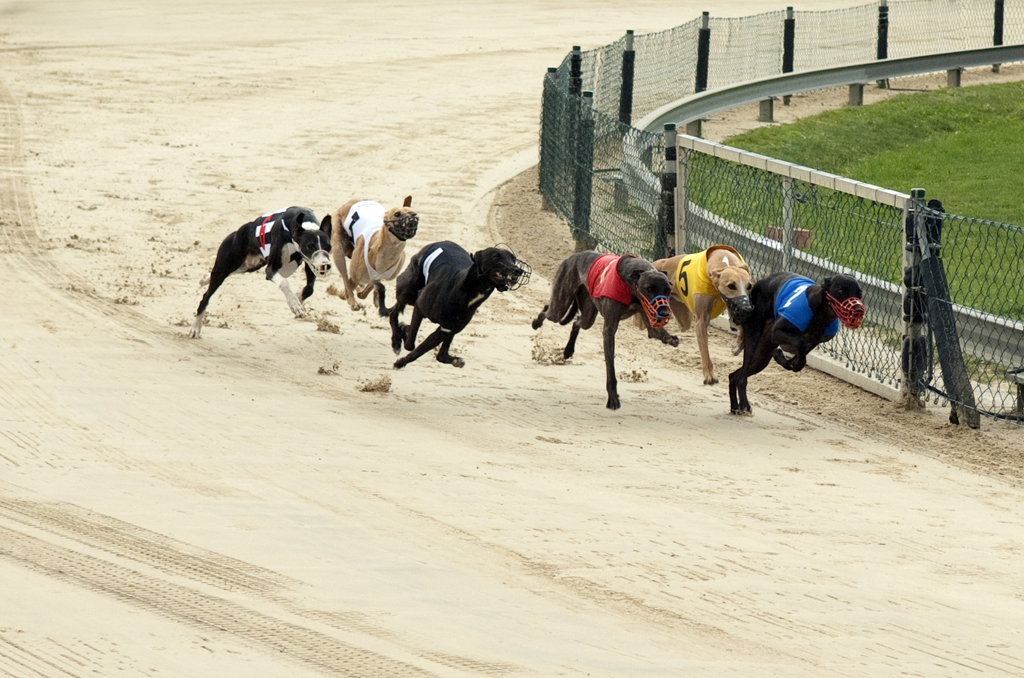Greyhound racing – Courtesy: Shutterstock – Image By Manfred Ruckszio
Out with the old, in with the new.
In the November 2018 Florida Primary Election, voters vigorously voted to pass Amendment 13, a vote that would ultimately ban greyhound racing across the state by 2020’s end.
Since the vote, ten tracks in Florida have suspended their dog racing operations, leaving the Palm Beach Kennel Club as the lone track in the final stretch of the year. With that, hundreds of dogs will be out of commission at year’s end with nowhere to race.
After decades of hosting greyhound races, the St. Petersburg Derby Lane closed for good on Sunday, December 27, 2020, with a 12:30 p.m. matinee race. It was the oldest continuously operating greyhound track in the world and would’ve turned 95 years old on January 3, 2021.
According to animal welfare advocates and sport players, most dog owners have retired and adopted out their dogs since tracks began to suspend operations two years ago. As for others? Some owners sent their dogs to other states that still host races. There is no current paper trail that tracks where the dogs go after they retire from racing. The industry is overseen by the Department of Business and Professional Regulation.
However, there is one group(s) that is banned from adopting these retired racing dogs—adoption groups that supported the ban of dog racing via Amendment 13. Per Executive Director of the National Greyhound Association Jim Gartland, only groups endorsing pro-racing or neutral on the matter are eligible to adopt the “athletes,” if you will.
Gartland continued to say why would they [NGA] work with the people who tried to push them out of business, expressing deep disdain for anti-racing groups.
For the individuals concerned with where the hundreds of dogs will go once racing is over in Florida come next week: there is a silver lining in that there are roughly 100 industry-endorsed adoptions organizations ready to take the dogs in and find them a permanent home. Even anti-racing advocates like Carey Theil, Grey2k executive director, believe that no dog will be left behind.
The remaining rift in Florida may predict what is to come in 2021 for the remaining four tracks in the three states of Arkansas, Iowa, and West Virginia, with the two remaining tracks in Arkansas and Iowa slated to phased out by 2022, leaving West Virginia’s two tracks as the lone wolves.
This does not bode well with the industry as it has seen a drastic decline in wagering from $3.5 billion during the sport’s peak in 1991 to below $500 million in 2018 across the 19 active tracks during the span. Similarly, the population of greyhounds racing nationwide has declined from 26,000 dogs in the year 2000 to an estimated 3,000 among the last three states.
The end of the dog racing era in Florida has come to an end. It is largely to thank animal activists and welfare groups that have long scrutinized the practice of displaying animals for sport or entertainment through captivity. Businesses such as SeaWorld have made announcements to stop their practices of showcasing animals for show amid criticism of the harsh treatment of wild and exotic animals, and it seems like those groups have pushed enough for the racing industry to see its demise moving forward as well.
The final greyhound race in Florida will be held at the Palm Beach Kennel Club on New Year’s Eve at 11:59 p.m., taking the last possible time slot allowed by state law. The race will be a hello to 2021 and a goodbye to 2020, with the gates scheduled to open at 11 a.m.
To find out more about the event details click here.
Stories that matter are our priority. At Florida Insider, we make sure that the information we provide our readers is accurate, easy-to-read, and informative. Whether you are interested in business, education, government, history, sports, real estate, nature or travel: we have something for everyone. Follow along for the best stories in the Sunshine State.
Chris began his writing as a hobby while attending Florida Southern College in Lakeland, Florida. Today he and his wife live in the Orlando area with their three children and dog.

